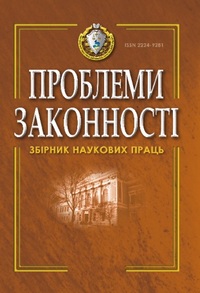Тимчасовий доступ до речей і документів: проблемні питання правозастосовної практики
Temporary access to things and documents: problematic issues of law enforcement
Author(s): O. Kaplina, Volodymyr I. MARYNIVSubject(s): Law, Constitution, Jurisprudence, Criminal Law, Victimology
Published by: Національний юридичний університет імені Ярослава Мудрого
Keywords: victim; temporary access to things and documents; law enforcement practice; decision of investigating judge; security measures;
Summary/Abstract: The article explores the issues of the victim’s involvement in the process of obtaining temporary access to things and documents. The current legislative provisions were analyzed, according to it only the parties to criminal proceedings have the right to appeal to the investigating judge during the pretrial investigation or the court during the court proceedings requesting temporary access to things and documents. It is established that when a victim is not a part of the criminal proceedings, he is not empowered to apply to the investigating judge with a request for temporary access to things and documents. However,the practice of applying the law evidences about application another one approach to the solution of this issue, in particular, the existing court decisions on granting the investigative judge permission to the victim to temporary access to things and documents. This practice has led the Supreme Court to find that there is a lack of clarity, uncertainty about the legal rules regarding the victim’s status and his rights in criminal proceedings, which constitutes an exclusive legal problem. In order to resolve this issue and to ensure the development of the law and the formation of a single law enforcement practice, the panel of judges concluded that it was necessary to refer the criminal proceedings to the Grand Chamber of the Supreme Court. In order to resolve this problem and to ensure the development of law and the formation of a uniform law enforcement practice, the panel of judges concluded that it was necessary to refer criminal proceedings to the Grand Chamber of the Supreme Court and to ask questions for clarification of the legislative provisions. On the basis of the generalized case law, it was concluded that there is no unity in approaches to granting the victim permission for temporary access to things and documents. It is concluded that the issues raised in the article are theoretical and practical issues of granting the victim permission for temporary access to things and documents which need their legislative solution.
Journal: Проблеми законності
- Issue Year: 2020
- Issue No: 149
- Page Range: 200-212
- Page Count: 13
- Language: Ukrainian

